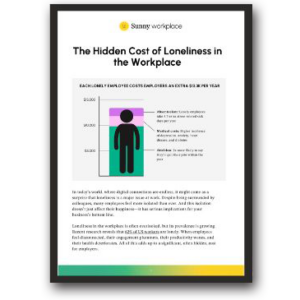
The importance of friends at work and how to form them
Anyone in the working world knows that having friends at work can be the difference between a great gig and ‘just another job.’
Whether in an office, remote, or hybrid setting, workplace friendships provide a sense of belonging and support that transcends the daily grind. They turn ordinary tasks into enjoyable experiences, significantly boosting overall employee satisfaction, productivity, and social well-being
But friendship at work holds value beyond that of a go-to lunch buddy. It plays an important role in creating a positive corporate culture where workers feel valued and connected. In fact, studies prove that employees with a close friend at work are more engaged, productive, and likely to stay with their company longer. According to a Gallup poll, those with meaningful work relationships are more than twice as likely to be engaged in their jobs than those without strong workplace bonds.
Sadly, recent reports from the Wall Street Journal show a drop – from 22% to 17% between 2019 and 2022 – in the number of people claiming to have a close friend at work. This decline may explain many employees’ lack of enthusiasm for post-pandemic office life. But it also reveals how fostering workplace friendships could be the key to rebuilding lively, thriving, and productive workspaces.
TL,DR:
Workplace friendships are a key driver of engagement, retention, and productivity. Employees with close friends at work tend to be more satisfied, creative, and likely to stay longer. Yet, recent declines in workplace friendships highlight the need for employers to actively foster these connections. This article explores the benefits of a connected workforce and offers practical strategies for building a culture that encourages social bonds—whether teams are in-office, hybrid, or fully remote.
This article explores why workplace friendships matter, the benefits they provide, and practical ways to forge rewarding relationships from both an employee and employer perspective. It also provides tips on how to make friends at work and how organizations can help nurture meaningful connections for greater social well-being.
Benefits of having a close friend in the workplace
Having a close friend at work is more than just a nice perk—it’s a powerful driver of professional and personal growth. Workplace friendships offer substantial benefits for both employees and employers, creating a symbiotic relationship that enhances individual well-being and organizational success. Here’s how:
Employee impact
- Increased productivity: Employees with close friends at work are often more productive. The mutual support and encouragement from a friend can boost motivation and help individuals tackle tasks more efficiently.
- Innovative ideas: Collaboration with friends can spark creativity. Comfortable working relationships foster an open exchange of ideas, leading to innovative solutions and fresh perspectives.
- Emotional support: The workplace can be a source of stress and pressure. Having a friend to share these experiences with provides crucial emotional support, helping employees navigate challenges more effectively and maintain their mental health.
- Higher job satisfaction: Friendships at work significantly enhance job satisfaction. When employees feel connected to their peers, they find more joy and meaning in their daily tasks, leading to higher morale and a more positive work environment.
- Better work-life balance: Friends at work can offer valuable advice and support in managing work-life balance, helping each other set boundaries and prioritize personal well-being.
Employer impact
- Increased engagement: Friendships at work enhance engagement. When employees feel connected to their peers, they are more likely to be committed to their job and invested in the company’s success. According to a Gallup study, employees who have a close friend at work are seven times more likely to be engaged in their jobs.
- Lower turnover: Companies with a culture that promotes friendships tend to have lower turnover rates. Employees who feel a strong sense of belonging, versus a weak one, experience a 56% increase in job performance, a 50% reduction in turnover risk, and a 75% decrease in sick days. The emotional bonds formed through friendships can make employees feel more loyal to their organization, reducing the likelihood of them seeking opportunities elsewhere.
- A positive culture: A workplace that fosters friendships cultivates a positive and collaborative organizational culture, enhancing psychological safety. Research has shown that psychological safety increases productivity, performance, job satisfaction, and morale, and indirectly acts as a buffer against stress. This environment attracts top talent, as potential employees are drawn to companies known for their supportive and friendly atmosphere.
- Stronger teams: Friendships improve team cohesion and cooperation. When employees trust and like each other, they work together more effectively, leading to better team performance and project outcomes.
- Easier conflict resolution: Strong friendships can aid in conflict resolution. Friends are more likely to address and resolve conflicts quickly and amicably, minimizing disruptions and maintaining a harmonious workplace.
How to foster friendships at work—In the office, hybrid, or remote
Building and maintaining workplace friendships takes effort, but it’s worth it. Whether in an office, hybrid, or remote setting, here are strategies to help build these important connections:
Employee strategies
- Stay in touch: Reach out to colleagues regularly, whether it’s through instant messaging, video calls, or face-to-face interactions. Consistent communication builds familiarity and trust, which are the foundations of any friendship.
- Join social events: Engage in company-organized social activities, such as team lunches, after-work gatherings, or virtual coffee breaks. These are great opportunities to get to know your coworkers better.
- Be open and approachable: Show genuine interest in your colleagues’ lives. Ask about their weekends, hobbies, or family. Sharing personal stories can help find common ground and build connections.
- Offer help and support: Be willing to assist colleagues with their tasks or offer a listening ear when they need it. Acts of kindness and support strengthen friendships and create a positive work environment.
- Start a social group: Join or create a social group or club within the workplace. Whether it’s a book club, sports team, or hobby group, these gatherings provide regular opportunities to bond over shared interests.
Employer strategies
- Encourage team-building: Organize regular team-building events that foster collaboration and camaraderie. Activities like group projects, workshops, or retreats can help employees form stronger connections.
- Promote a collaborative culture: Create a workplace culture that values teamwork and collaboration. Encourage open communication, mutual respect, and shared goals to help employees feel connected and supported.
- Design social workspaces: If in an office, design spaces that facilitate interaction, such as open-plan areas, break rooms, and lounges. For remote teams, create virtual collaboration spaces using digital tools.
- Support new hires: Develop comprehensive onboarding programs that include social integration, like pairing new hires with mentors or buddies to help them build relationships from day one.
- Recognize and reward social initiatives: Acknowledge and reward employees who contribute to a positive social environment. Recognitions such as “Friend of the Month” or team collaboration awards can motivate employees to engage more with their peers.
- Facilitate cross-departmental interactions: Encourage interactions between different departments through inter-departmental projects or social events. This broadens employees’ networks and builds a sense of unity within the organization.
- Leverage technology for connection: Use digital tools to keep remote and hybrid teams connected. Platforms for instant messaging, virtual meeting rooms, and online collaboration can bridge the gap created by physical distance.
Navigating the challenges of workplace friendships
While workplace friendships offer many benefits, they also come with challenges that need careful navigation. Balancing professionalism with personal connections can be tricky, and office power dynamics can complicate relationships. Here are some strategies to address these challenges:
Balancing professionalism and friendship
- Set boundaries: Clearly define the boundaries between work and personal life. Ensure that your friendship does not interfere with your professional responsibilities. Discuss and agree on what is acceptable behavior in the workplace to avoid misunderstandings.
- Stay objective: Keep your professional judgment unbiased. Ensure that your friendship does not influence work-related decisions, such as performance evaluations or promotions. Strive to treat all colleagues fairly, regardless of personal relationships.
- Communicate openly: Discuss potential conflicts openly and honestly. If issues arise, address them directly and respectfully. Open communication helps prevent small misunderstandings from escalating into bigger problems.
- Respect privacy: Be mindful of sharing personal information at work. Ensure that personal discussions remain private and do not spill over into the professional domain. Respect your friend’s confidentiality and expect the same in return.
- Balance time and attention: Ensure that your friendship does not exclude other colleagues. Balance your interactions to avoid perceptions of favoritism or cliques, which can lead to workplace tension.
Managing power dynamics
- Acknowledge hierarchies: Recognize the existing power dynamics in the workplace. If you are in a supervisory role, maintain professional boundaries to ensure that your friendship does not compromise your authority or objectivity.
- Avoid conflicts of interest: Be cautious of situations where your friendship might create a conflict of interest. Refrain from involving your friend in projects or decisions where impartiality is crucial.
- Encourage inclusivity: Foster an inclusive environment where all team members feel valued and respected. Encourage friendships across different levels of the organization to minimize power imbalances.
- Seek feedback: Regularly seek feedback from colleagues to ensure that your friendship is not negatively impacting the workplace. This helps in maintaining a healthy balance between personal and professional interactions.
- Stay professional during conflicts: If conflicts arise between friends, address them professionally. Separate personal feelings from professional responsibilities and work towards resolving issues in a fair and objective manner.
The power of workplace friendships
Workplace friendships are often the ‘secret sauce’ for creating a positive and productive work environment. They offer significant perks for both employees and employers – from increased job satisfaction and emotional support to higher engagement and retention.
Sure, these relationships require thoughtful consideration and clear boundaries, but the payoff is well worth the investment. By actively encouraging and nurturing social connections among colleagues, companies can build a more collaborative, innovative, and supportive culture.
The power of friendship at work is a testament to the power of meaningful human connection. When we prioritize social well-being, we elevate both individual and organizational well-being.


